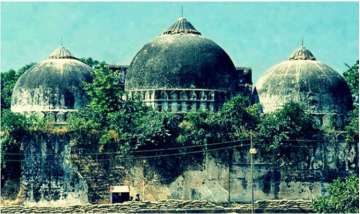Section 144 has been imposed in Ayodhya District by the District Magistrate in anticipation of Ram Mandir-Babri Masjid dispute verdict. Section 144 will be in effect till December 10. Ayodhya District administration is on alert.
A five-judge Constitution bench headed by Chief Justice of India Ranjan Gogoi, which started the day-to-day proceedings on August 6 after mediation proceedings failed to find an amicable solution to the vexatious dispute, has revised the deadline for wrapping up the proceedings and has fixed it on October 17.
What is Section 144?
Section 144 of CrPC prohibits unlawful assembly of people. Imposition of this section may help administration and the government take preventive measures before a prominent development just like a possible verdict on Ayodhya dispute.
When a District Magistrate imposes Section 144 in a district, four or more people cannot assemble together in public. If they do, it is declared unlawful. Section 144 empowers administration and police to book these people for rioting.
Ayodhya dispute in Supreme Court
Fourteen appeals have been filed in the apex court against the 2010 Allahabad High Court judgment, delivered in four civil suits, that the 2.77-acre land in Ayodhya be partitioned equally among the three parties -- the Sunni Waqf Board, the Nirmohi Akhara and Ram Lalla.
Initially, as many as five lawsuits were filed in the lower court. The first one was filed by Gopal Singh Visharad, a devotee of 'Ram Lalla', in 1950 to seek enforcement of the right to worship of Hindus at the disputed site.
In the same year, Paramahansa Ramachandra Das had also filed the lawsuit for continuation of worship and keeping the idols under the central dome of the now-demolished disputed structure. The plea was later withdrawn.
Later, the Nirmohi Akhara also moved the trial court in 1959 seeking management and 'shebaiti' (devotee) rights over the 2.77 acre disputed land.
Then came the lawsuit of the Uttar Pradesh Sunni Central Wakf Board which moved the court in 1961, claiming title right over the disputed property.
The deity, 'Ram Lalla Virajman' through next friend and former Allahabad High Court judge Deoki Nandan Agrawal, and the Janambhoomi (the birthplace) moved the lawsuit in 1989, seeking title right over the entire disputed property on the key ground that the land itself has the character of the deity and of a 'Juristic entity'.
Later, all the lawsuits were transferred to the Allahabad High Court for adjudication following the demolition of the disputed Ram Janambhoomi-Babri masjid structure on December 6, 1992, sparking communal riots in the country.
Earlier, the bench, also comprising justices S A Bobde, D Y Chandrachud, Ashok Bhushan and S A Nazeer, had said it would wrap up the hearing by October 17, a day sooner than the earlier schedule.
Fixing the schedule for the final leg of the lengthy arguments, it had said that the Muslim side would complete the arguments on October 14 and thereafter, two days would be granted to the Hindu parties to sum up their rejoinders by October 16.
October 17 would be the last day for wrapping up the hearing when the parties will have to make the final arguments about the relief they are seeking, the court had said.
(With PTI inputs)
Also Read | Muslim group favours handing over land in Ayodhya to Hindus
Also Read | Ayodhya prepares for most astonishing Diwali ever with 3.25 lakh diyas
Watch | Did CM Yogi Adityanath hint at construction of Ram Temple in Ayodhya?
Latest India News
